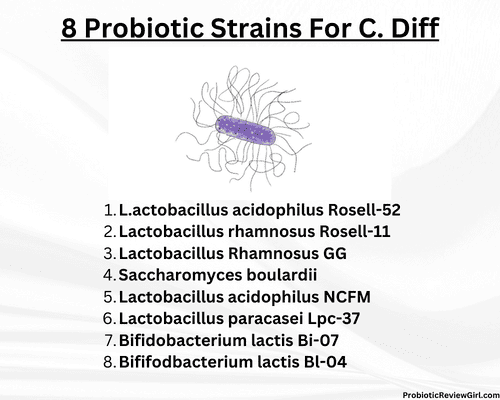Do Probiotics Help Prevent Clostridium Difficile?
Probiotics can both prevent and treat C. difficile‐associated diarrhea according to a 2017 study authored by JZ Goldenberg. Probiotics may also prevent C. difficile infection according to a separate 2018 review by JP Mills.
In 2015, The CDC estimated that neatly 500,000 Americans suffered from C. Difficile and 15,000 died from the common but serious infection. Clostridium difficile is a species of bacteria that can cause serious infections, particularly in healthcare environments.
Probiotics are live microorganisms that, when consumed in adequate amounts, provide health benefits by improving the balance of beneficial bacteria in the gut.
What Is C Difficile?
Clostridium difficile, commonly referred to as C. difficile or C. diff, is a type of bacteria that can lead to significant infections, especially in healthcare environments. C. diff is naturally present in the gut of a small percentage of adults and a significant proportion of infants. In healthy individuals with a well-balanced gut microbiota, C. difficile does not cause any harm as the normal gut bacteria keep its population in check.
Antibiotics can disrupt the balance of gut bacteria, creating an opportunity for C. difficile to multiply and cause infections. Pathogenic strains of C. difficile produce toxins that can induce intestinal inflammation, leading to conditions such as C. difficile-associated diarrhea (CDAD) and colonic damage.
This infection is prevalent in healthcare settings, posing a greater risk to vulnerable patients, including the elderly and those with serious health conditions. C. difficile is recognized as a major cause of infectious diarrhea in hospitals and care homes, necessitating effective prevention and treatment strategies.
Can Probiotics Help With C. Difficle?
Yes, Probiotics have the potential to be effective in preventing Clostridium difficile-associated diarrhea (CDAD) and reducing the risk of C. diff infection. A 2022 study authored by A Al Sharaby, indicated that probiotics are beneficial in preventing CDAD, with moderate certainty evidence supporting their effectiveness.
The 2022 study stated, Probiotics have been shown to help inhibit the proliferation and virulence of C. diff by supporting a healthy gut microbiome. The American College of Gastroenterology recommends probiotics for preventing CDAD, while other sources emphasize the need for further research and cautious recommendations.
Probiotics are considered a potential intervention but require more robust evidence and individualized approaches for preventing C. diff. Conflicting results from previous clinical trials and the lack of strong evidence have also been highlighted by Dr Colleen R. Kelly.
8 Best Probiotic Strains For C. Diff
The 8 best probiotic strains with the most amount of clinical research for c. diff recovery are shown in a graphic and then listed below.

Can Yogurt Help C. diff?
Yes, there is evidence suggesting that yogurt, which contains probiotics, can help combat C. difficile infections. The overall consensus is that probiotics, including those found in yogurt, can be beneficial in reducing or eliminating watery diarrhea caused by C. diff. Other fermented foods like Kombucha, Miso, Kimchi and Sauerkraut are also useful in reducing C. Diff symptoms.
Can Probiotics Make C. diff Worse?
There are some sources suggesting that probiotics may not be effective for C. Diff but no evidence to show probiotics worsen C. difficile infections. There is still ongoing debate and differing opinions on if probiotics can make C. Diff worse within the medical and scientific community and the research in this area is complex and evolving, and there is no definitive consensus at this time.
Can Antibiotics Make C. diff Worse?
Antibiotics can worsen C. difficile infections by disrupting the gut bacteria balance. Taking antibiotics kills probiotics bacteria, allowing C. diff to multiply and release toxins, leading to symptoms like diarrhea and abdominal pain.
Certain antibiotics have a higher risk of causing C. diff infections with people on antibiotics or recently treated with them are 7 to 10 times more likely to develop C. diff infections. Although antibiotics are necessary for treating bacterial infections, they increase the risk of C. diff infections.
Dr. Sara Mesilhy has a Master’s degree in Gastroenterology and holds a membership with the Royal College of Physicians of the United Kingdom. She completed her Bachelor of Medicine, Bachelor of Surgery (MBBS) at Cairo University and is currently part of the ProbioticReviewGirl medical team.